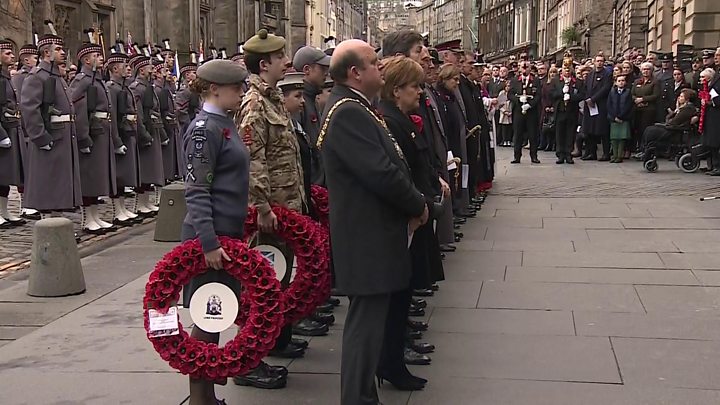Remembrance
His poppy was a metallic,
mine plastic. I was counting down
the minutes till we advised customers
of two minutes silence.
He says "I'll take a receipt
as my wife has Alzheimer's.
She still likes to check what
I spend, though." Later I overhear
what happened at yesterday's
two minute silence for Armistice Day.
"There were queues. One old fella
at back pipes up "A tha all on bloody strike!
Meantime fella outside on his market stall
were still hollering. I were ready
to go out and stuff his turnips in his face.
I reckon some folk don't reckon right."

World War I ended with an armistice that began at the 11th hour of the 11th day of the 11th month of 1918. A year later 11 November was marked as Armistice Day in the UK, including 2 minutes of silence beginning at 11:00 AM as a mark of respect for those who died in the war and those left behind. The 2-minutes tradition had begun as the Two Minute Silent Pause of Remembrance held in Cape Town, South Africa, which lasted from 14 May 1918 to 14 May 1919; at noon every day a cannon would be fired as a signal followed by 1 minute of thanksgiving for those who had returned alive and 1 minute to remember the fallen. At the instigation of South African businessman Sir Percy Fitzgerald, on 7 November 1919 king George V proclaimed the practice: "To all my people, Tuesday next, November 11, is the first anniversary of the armistice, which stayed the world-wide carnage of the four preceding years, and marked the victory of right and freedom. I believe that my people in every part of the Empire fervently wish to perpetuate the memory of that great deliverance and of those who laid down their lives to achieve it. To afford an opportunity for the universal expression of this feeling it is my desire and hope that at the hour when the Armistice came into force, the 11th hour of the 11th day of the 11th month, there may be for the brief space of two minutes a complete suspension of all our normal activities. During that time, except in the rare cases where this may be impracticable, all work, all sound, and all locomotion should cease, so that, in perfect stillness, the thoughts of everyone may be concentrated on reverent remembrance of the glorious dead." The practice is observed by the Last Post, a bugle or trumpet call, followed by an exhortation taken from Laurence Binyon's poem "For the fallen," written in September 1914 ("They shall grow not old, as we that are left grow old, Age shall not weary them, nor the years condemn. At the going down of the sun, and in the morning, We will remember them." followed by the crowd response, "We will remember them."), followed by 2 minutes of silence and then bugles playing "The Rouse," the tune used to signal the time for soldiers to arise from bed. Beginning in 1939, when World War II began, the 2-minute silence was moved to Remembrance Sunday, the Sunday nearest to 11 November, so that wartime production would not be interrupted. After that war the name of the holiday was changed to remembrance Day (Veterans Day in the US).
ReplyDelete